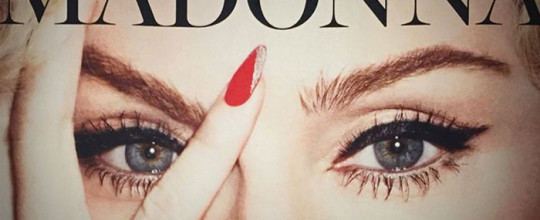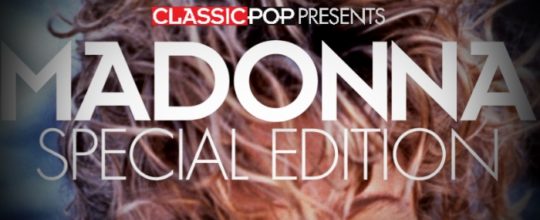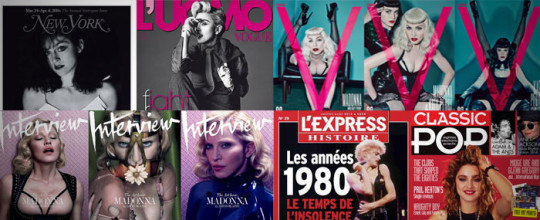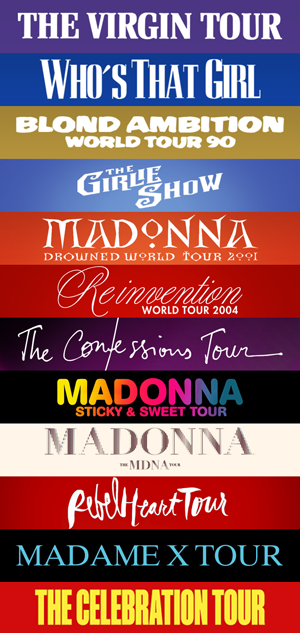The Harper’s Bazaar Cover Story
HarpersBazaar.com: have published their full Madonna interview from the magazine’s upcoming 150th anniversary issue. The article by Roxane Gay with the fantastic will appear in the February 2017 issue, available on newsstands January 17.
The portfolio features photographs by Luigi & Iango; hair by Andy LeCompte for Wella Professionals and makeup by Aaron Henrikson.
Manicure: Naomi Yasuda for Dior Vernis; Production: Beth Klein Productions; Set Design: Philipp Haemmerle. With special thanks to Diamond Horseshoe, New York.
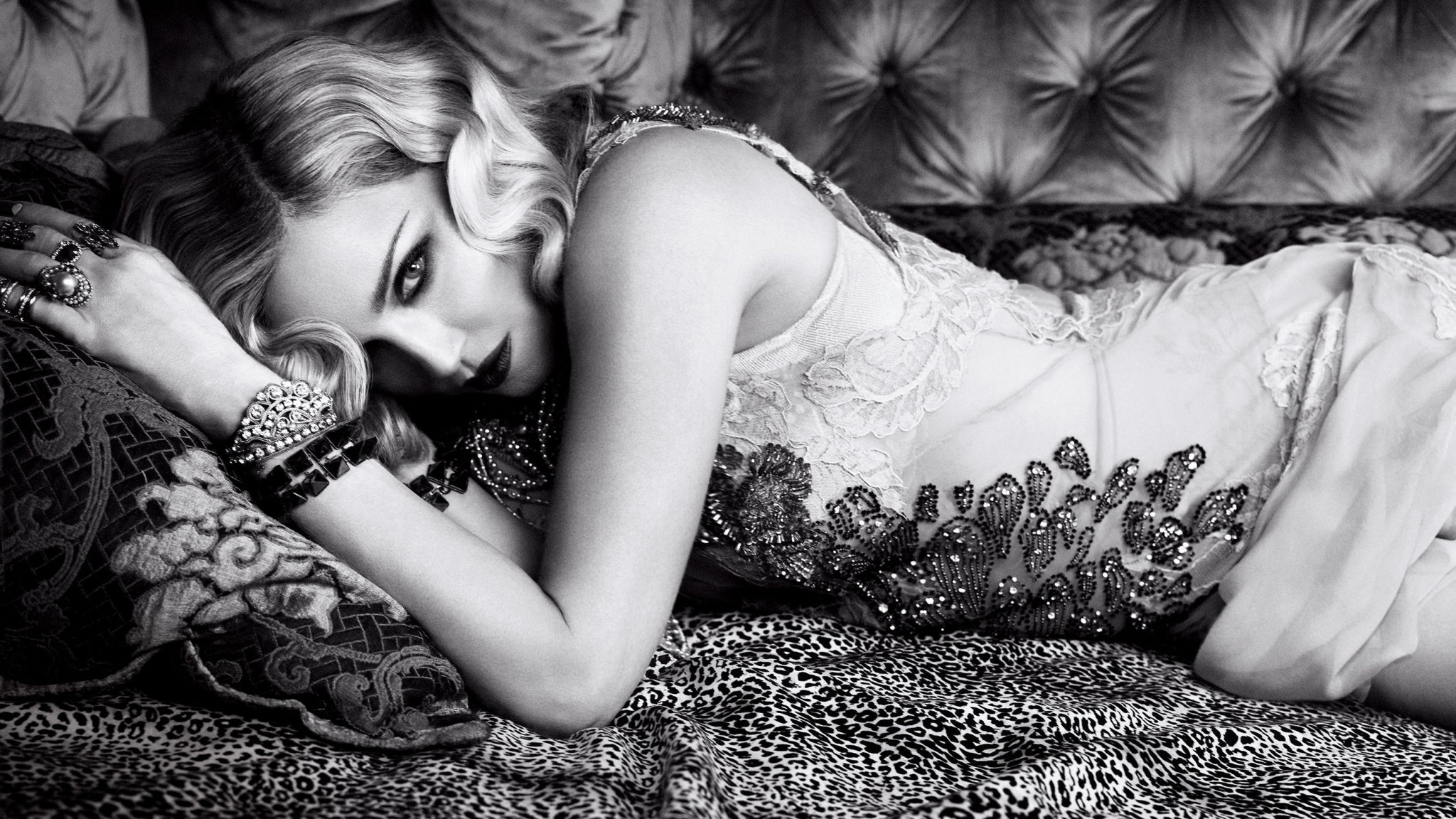
Alberta Ferretti gown; Erickson Beamon necklace; From left: Yeprem rings, Gucci, Sylva & Cie rings, and House of Emmanuele rings; New York Vintage headband (worn as bracelet); Carine Gilson garter belt; Madonna’s own spike bracelets and stockings.
Madonna’s Spring Awakening
The pop icon on election-night prayers, aging, and bad wine.
By Roxane Gay and Fashion Editor: Arianne Phillips
Madonna has no patience for bad wine. I learned this while sitting in a well-appointed living room at her New York City home, with Nina Simone playing softly in the background. I must tell you, Madonna’s house smells amazing—something delicious, maybe roasted chicken, was cooking in a kitchen elsewhere in the manse, and there was a gentle fragrance in the air, jasmine, perhaps. While I waited for Madonna, her day-to-day manager, her publicist, and I chatted while reclining on gorgeous cream-colored furniture set upon the largest rug I’d ever seen, on top of immaculate black wood floors. On the wall behind me was a black-and-white photograph of a woman perched on the edge of a mussed bed, scantily clad, sucking on a gun, it’s Helmut Newton’s “Girl with Gun” photograph. Of course.
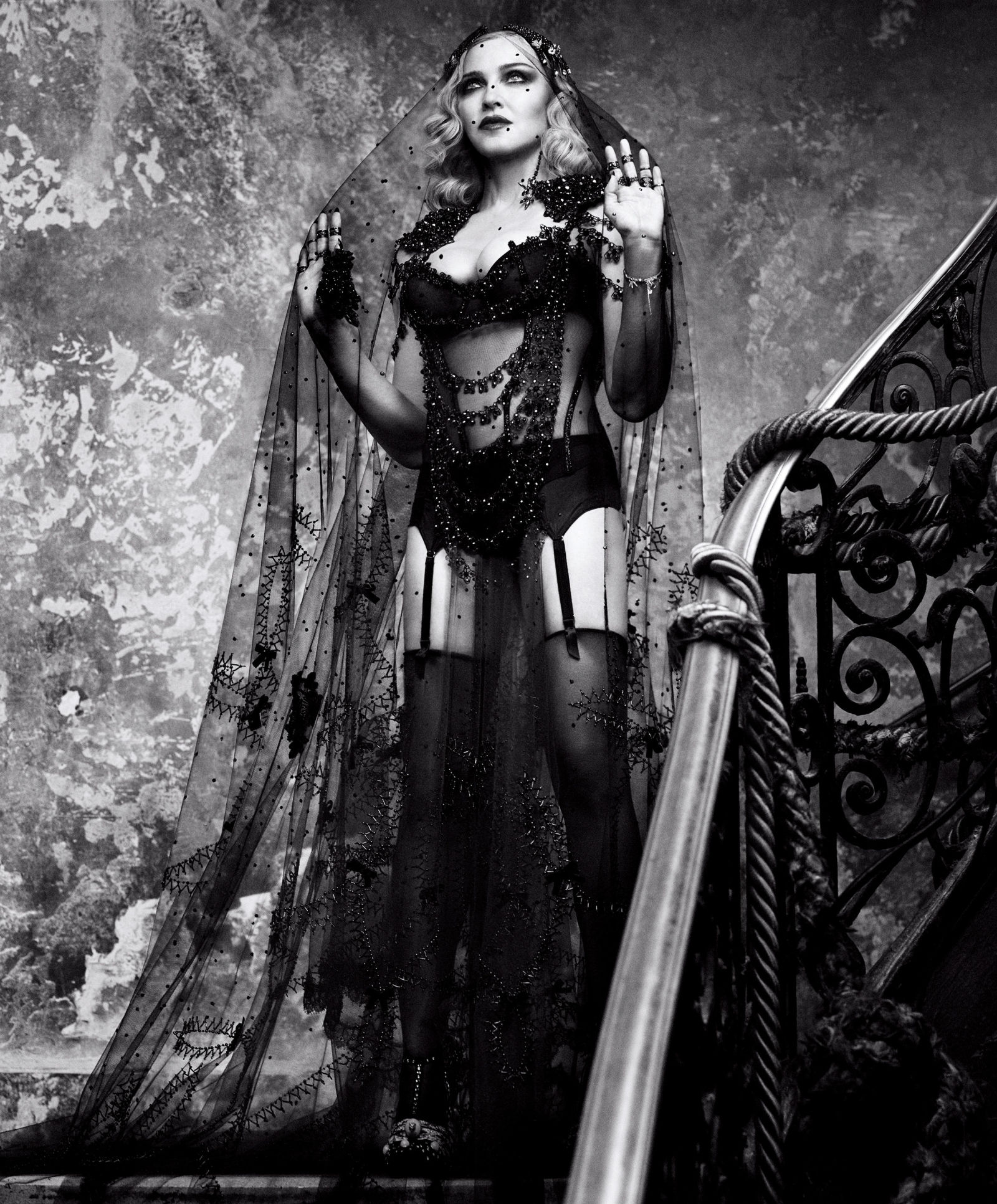
Gucci cape, hair band, and shoes; La Perla bodice; Erickson Beamon earring; H. Crowne body chain; Mordekai by Ken Borochov rings; I.D. Sarrieri suspender belt; Maison Close stockings.
Madonna was late, but that didn’t matter because she is Madonna. What is time, really? She was all apologies when she arrived, and we quickly got down to business. She was in the process of planning a fund-raiser at Art Basel in Miami Beach, and like any perfectionist she wanted to taste the wines that could be served. She knelt on the floor as she considered various reds and whites and a rosé—or “summer water,” as she called it. “Roxane,” Madonna said. “You don’t have to wear that dress tonight. …” That’s when I exhaled. This was familiar territory. My name is part of a well-known song or two. I smiled and said, “No, I do not.” At one point she asked me for my opinion on a particularly troublesome wine, handed me her glass, and swore she didn’t have anything contagious. I believed her and took a sip. To be fair, the wine was terrible—it tasted like vinegar—and the year on the bottle said 2016, so it wasn’t really wine yet. It was the suggestion of wine.
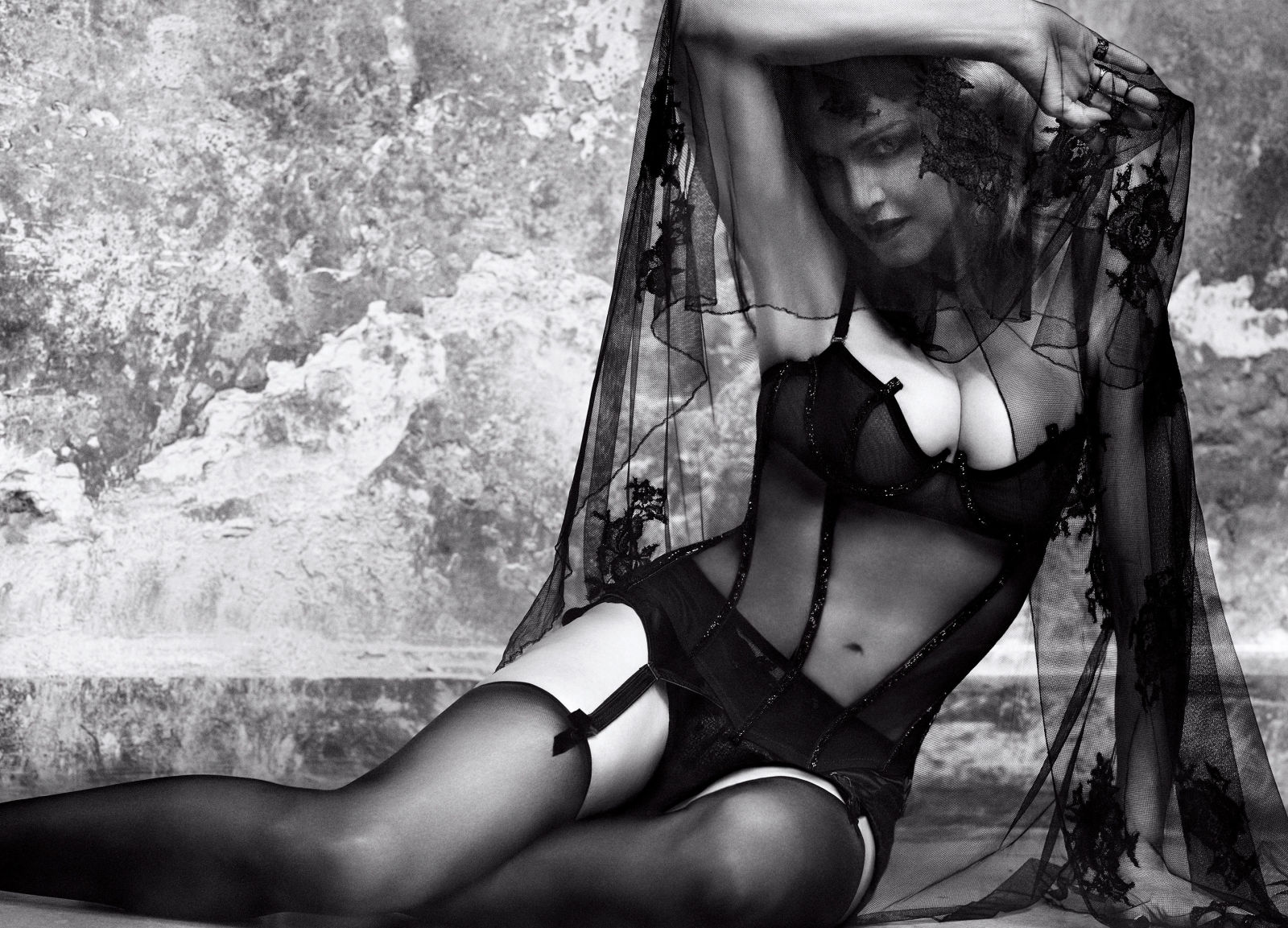
Rosamosario cape; La Perla bodice and briefs; Mordekai by Ken Borochov rings; I.D. Sarrieri suspender belt; Maison Close stockings.
Madonna is very good at multitasking. While she was considering the wines, she held forth with me, and before long she was done with the bad wine. “Take the mediocre out of here,” she tells Dustin, the strapping young man who served all the wine and apologized for its mediocrity even though that mediocrity was not his fault. “I’ll go broke before I drink bad wine,” she declared, and I was entirely in agreement. I wanted nothing more than for Madonna to offer her opinions on wine for the rest of the evening. Dustin promptly brought us the good wine, served in a crystal decanter. I drank it, and it was, indeed, good.
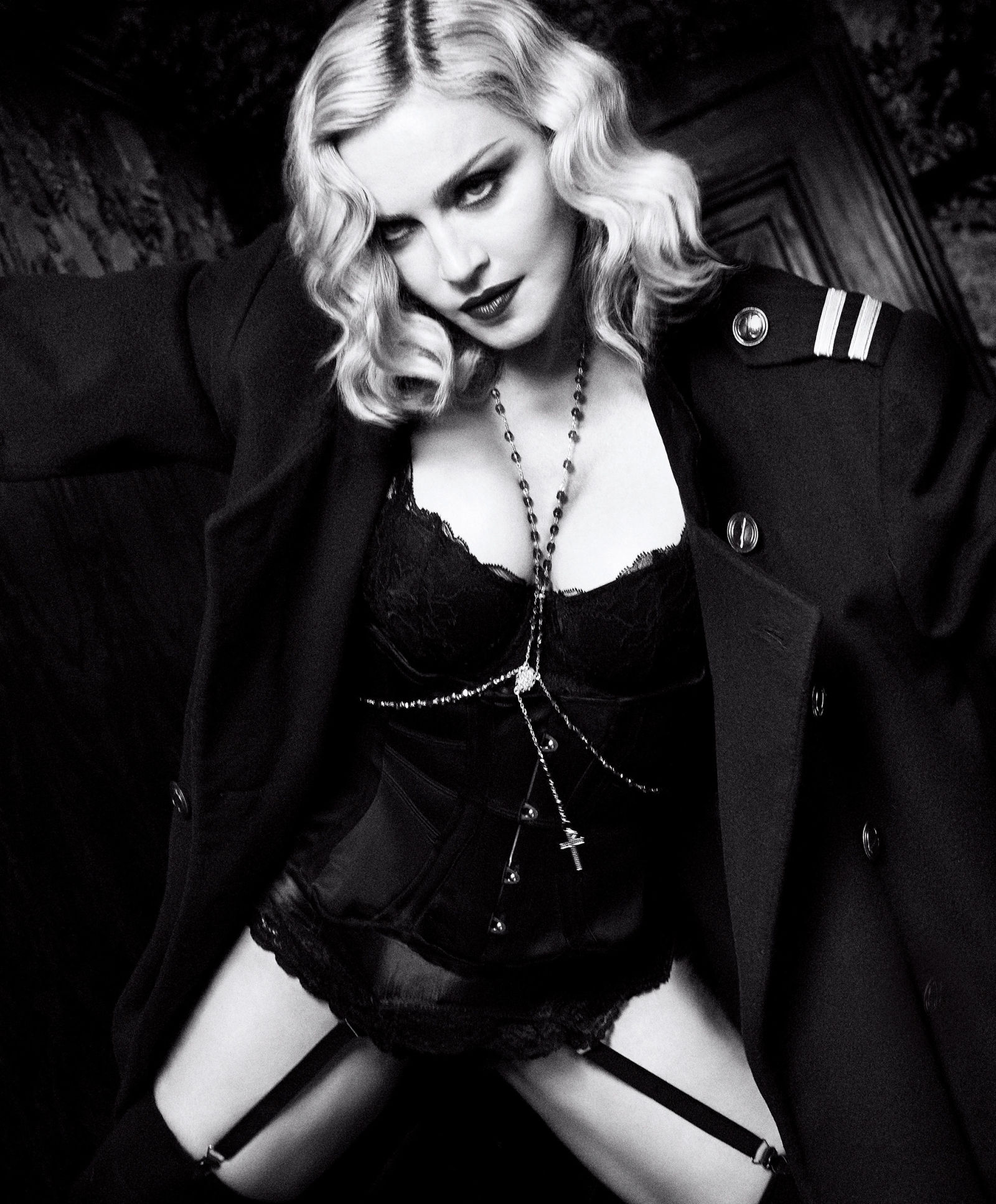
Christian Dior c/o the Way We Wore vintage jacket; Stella McCartney bra; Agent Provocateur waist cincher; La Perla briefs; Wolford stockings; Madonna’s own garter belt and rosary necklace.
In the days leading up to our conversation, I kept wondering what I could possibly ask Madonna that she hadn’t already been asked. She has been a figure in popular culture for more than 30 years. There was plenty I was curious about. I mean, I grew up on her music. As a good Catholic girl, I was obsessed with “Like a Prayer” and how she blended transubstantiation and eroticism. I listened to The Immaculate Collection nonstop. I coveted her book Sex, which came out just as I turned 18. I’ve been intrigued by her personal life. I’ve admired her stamina and artistic evolution. But I didn’t want to ask silly questions. I didn’t want to pry even though my job was, of course, to pry.
“I don’t believe there’s a certain age where you can’t say and feel and be who you want to be.”
Over the course of an hour, we talked about a great many things, but we started with her upcoming movie project, Loved, an adaptation of Andrew Sean Greer’s novel The Impossible Lives of Greta Wells. On her coffee table, there were binders filled with research for the project—potential settings, costumes, and so on. Madonna is thorough. In fact, she co-wrote the screenplay and will be directing the film. The novel follows the title character as she moves through time and negotiates three different lives she could have lived. The story also focuses on Greta’s relationship with her gay twin brother, Felix, in those different lives. “It touches on a lot of really important topics I’ve always been invested in or championed—fighting for women’s rights, gay rights, civil rights, always fighting for the underdog,” Madonna says. “I’ve always felt oppressed. I know a lot of people would go, ‘Oh, that’s ridiculous for you to say that. You’re a successful white, wealthy pop star,’ but I’ve had the shit kicked out of me for my entire career, and a large part of that is because I’m female and also because I refuse to live a conventional life. I’ve created a very unconventional family. I have lovers who are three decades younger than me. This makes people very uncomfortable. I feel like everything I do makes people feel really uncomfortable. Why does this book appeal to me? Why did I want to adapt it into a screenplay? Because it touches me on so many levels and it deals with so many important topics. Right now, more than ever, it’s an extremely timely story to tell.”
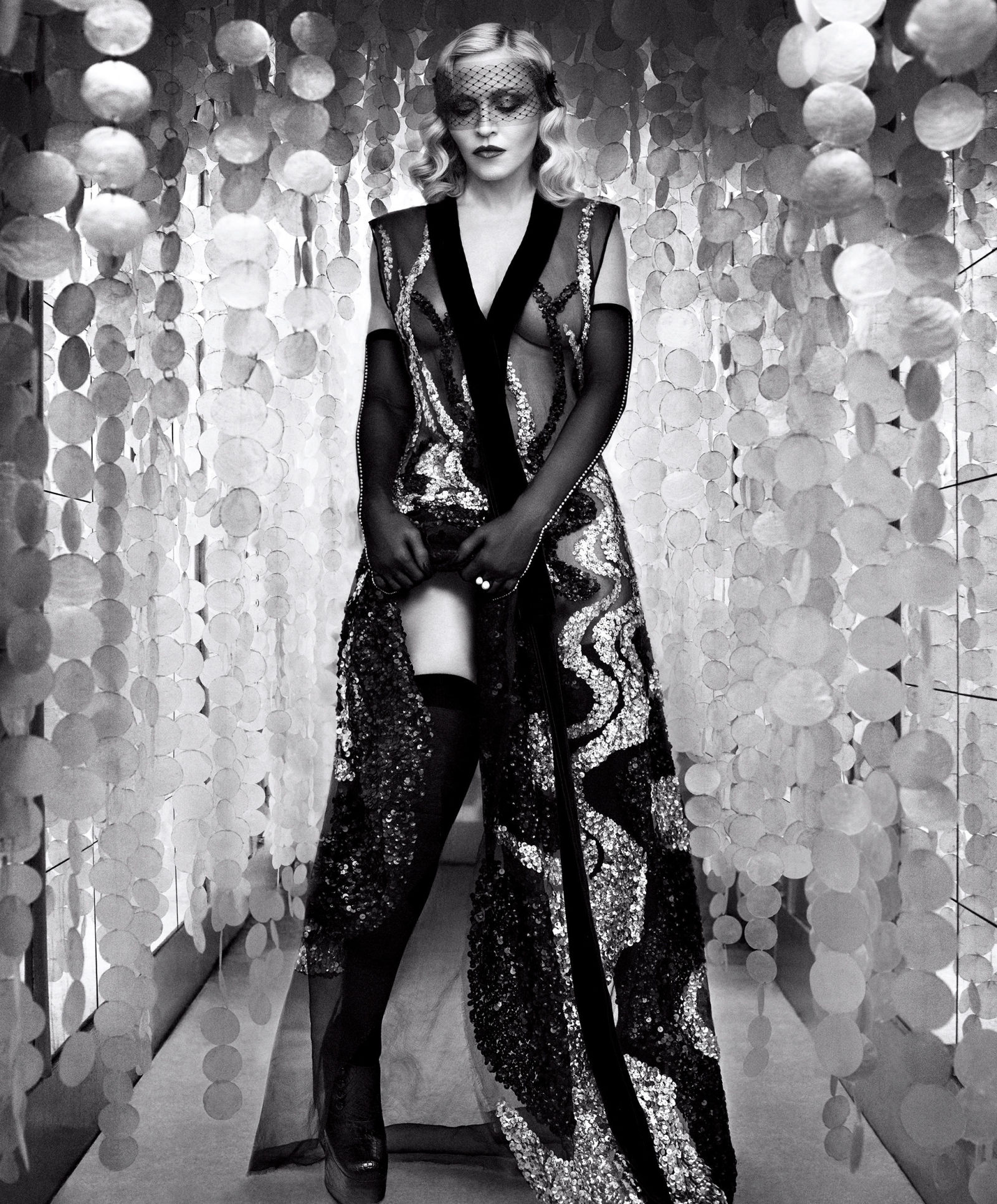
Marc Jacobs dress and shoes; Maison Close eye mask; Dries Van Noten gloves and ring; Wolford stockings.
Roxane Gay: As an artist, whether it’s in film or music or writing, do you think your work is political?
Madonna: Completely.
RG: How so?
M: Because I’m political. I believe in freedom of expression, I don’t believe in censorship. I believe in equal rights for all people. And I believe women should own their sexuality and sexual expression. I don’t believe there’s a certain age where you can’t say and feel and be who you want to be. All you have to do is look at my career—from my Sex book to the songs I’ve written, kissing a black saint in my “Like a Prayer” video, the themes I explored on my Erotica album. As I get older and I get better at writing and expressing myself, then you get into my American Life era, and I start talking about politics and government and how fucked our country’s politics are, and the illusion of fame and Hollywood and the beautiful people.
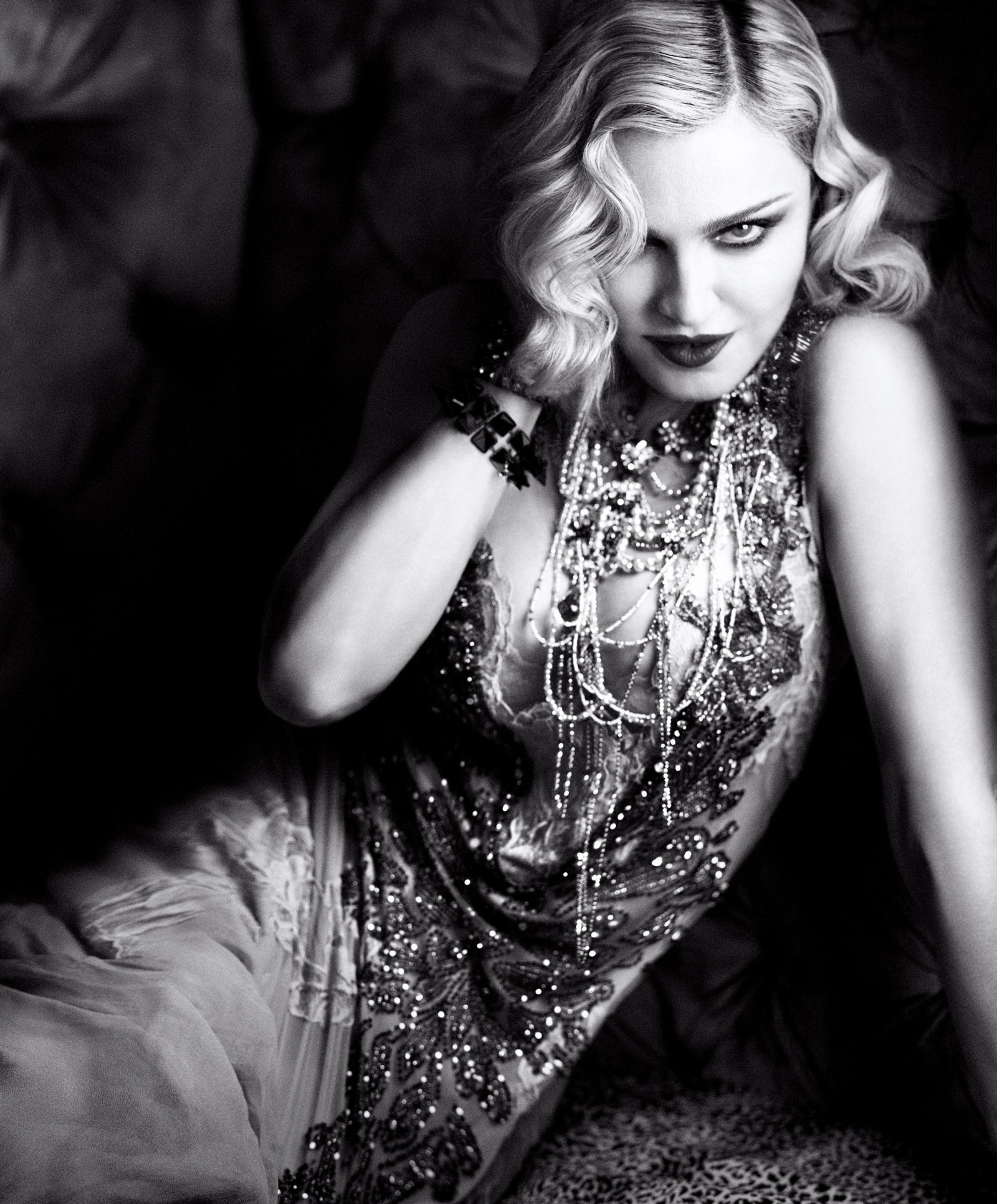
Alberta Ferretti gown; Erickson Beamon necklace; New York Vintage headband (worn as bracelet); Madonna’s own bracelet (bottom).
RG: It’s been almost two weeks since the election. How did you feel in the wake of Donald Trump being elected president of the United States? Were you surprised?
M: On election night I was sitting at a table with my agent, who is also one of my very best friends, and we were truly praying. We were praying. She was on her computer. She’s friends with someone who was working on Hillary [Clinton]’s campaign and was getting blow-by-blow reports, and at one point she was like, “It’s not looking good.” It was just like watching a horror show. And then she was reading from the Quran, and I was reading from the Zohar. We were doing everything: lighting candles, meditating, praying, offering our lives to God forever, if only. I went to sleep, and since that night, I wake up every morning and it’s like when you break up with somebody who has really broken your heart. You wake up and for a second you’re just you, and then you go, “Oh, the person I love more than anything has just broken my heart, and I’m devastated and I’m broken and I have nothing. I’m lost.” That’s how I feel every morning. I wake up and I go, “Wait a second. Donald Trump is the president. It’s not a bad dream. It really happened.” It’s like being dumped by a lover and also being stuck in a nightmare.
“I wake up and I go, ‘Wait a second. Donald Trump is the president. It’s not a bad dream. It really happened.'”
RG: What do we do now?
M: I feel like I’m already doing it to a certain degree anyway and have been doing it. But I have to get way more vocal and become a little bit less mysterious. What I find really astonishing is how quiet everybody is in my industry. I mean, nobody in the entertainment business except for maybe a handful of people ever speak out about what’s going on. Nobody takes a political stance or expresses an opinion.
RG: Why do you think that is?
M: They want to maintain a neutral position so they can maintain their popularity. I mean, if you have an opinion and people disagree with you, you might not get a job. You might be blacklisted. You might have fewer followers on Instagram. There are any number of things that would be detrimental to your career. Everyone’s really afraid. Because it doesn’t affect their daily life yet, no one’s doing anything about it.
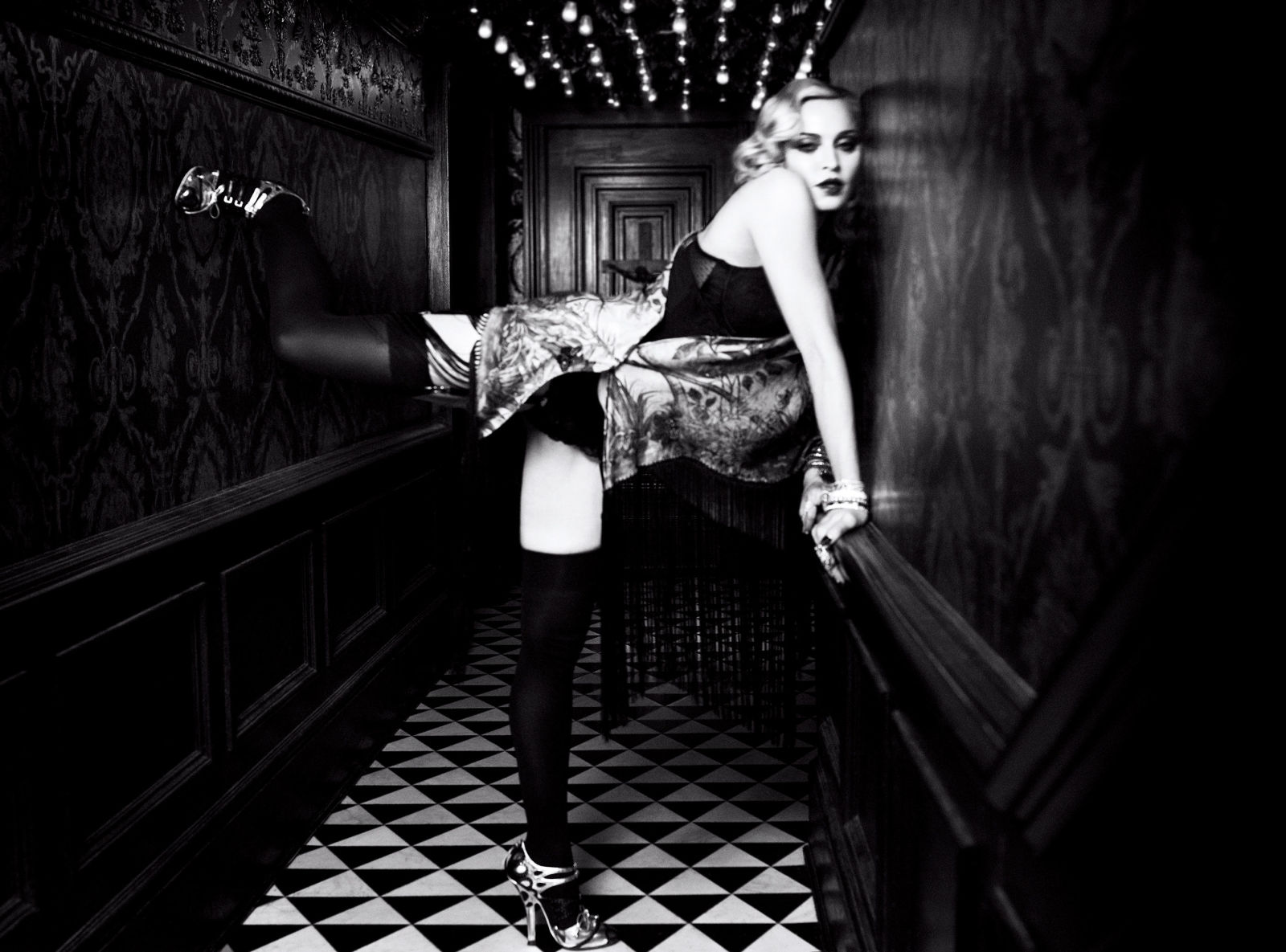
Gucci shawl; Stella McCartney bra; Agent Provocateur waist cincher; La Perla briefs; Colette ring; Wolford stockings; Miu Miu shoes; Madonna’s own garter belt and bracelets.
RG: How do you stay motivated after accomplishing so much?
M: Art keeps me alive. I’ve obviously been devastated or heartbroken all my life, since my mother’s death. I’ve had so many challenges throughout my career, however successful people perceive me to be. The only way I’ve been able to survive the betrayal of lovers, family members, and society is to be able to create as an artist.
RG: What beyond art gives you that kind of drive to keep doing what you do?
M: Wanting to inspire people. Wanting to touch people’s hearts to get them to look at life in a different way. To be a part of evolution, because, for me, it’s either you’re part of creation or you’re part of destruction. It’s inexplicable; it’s like breathing, and I can’t imagine not doing it. That is one of the arguments I would get into with my ex-husband, who used to say to me, “But why do you have to do this again? Why do you have to make another record? Why do you have to go on tour? Why do you have to make a movie?” And I’m like, “Why do I have to explain myself?” I feel like that’s a very sexist thing to say.
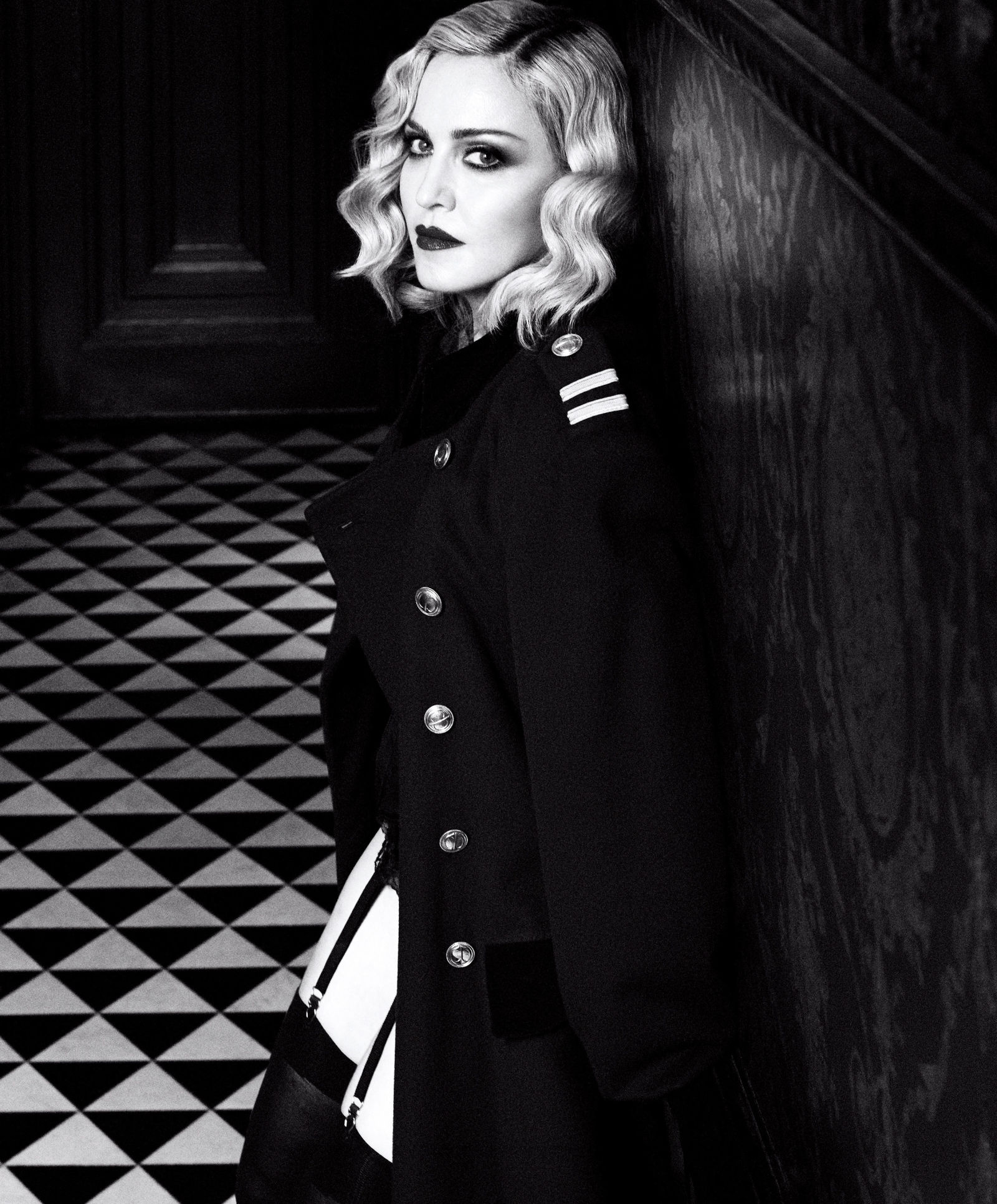
Christian Dior c/o the Way We Wore vintage jacket; La Perla briefs; Wolford stockings; Madonna’s own garter belt.
RG: Yes. Because nobody asks men that.
M: Does somebody ask Steven Spielberg why he’s still making movies? Hasn’t he had enough success? Hasn’t he made enough money? Hasn’t he made a name for himself? Did somebody go to Pablo Picasso and say, “Okay, you’re 80 years old. Haven’t you painted enough paintings?” No. I’m so tired of that question. I just don’t understand it. I’ll stop doing everything that I do when I don’t want to do it anymore. I’ll stop when I run out of ideas. I’ll stop when you fucking kill me. How about that?
RG: Do you still feel the same rush when you accomplish some new milestone? Or does it become commonplace?
M: No. When I made secretprojectrevolution [the 2013 short film that Madonna directed with the photographer Steven Klein, which dealt with the subject of artistic freedom], that was really exciting because it was a very political statement. And whenever I do my live shows, I feel artistically inspired and excited because I get to do and say a lot of things that I can’t if I just make a record. A lot of times it’s the only way people are going to hear my music because you don’t get to have your music played on Top 40 if you’re above the age of 35. It’s always exciting for me to perform. I’m liking the idea more and more of just standing up with a microphone and talking. I like talking; I like playing with the audience. That’s what I’ve started to do with “Tears of a Clown” [Madonna’s most recent stage show, which combines music and storytelling]. I’m obsessed with clowns and what they represent and the idea that clowns are supposed to make you laugh, but inevitably they’re hiding something. That’s how I look at my life. I keep telling Amy Schumer and Dave Chappelle and Chris Rock that I’m going to do stand-up and they’d better watch out. I’m coming. I’m coming right behind them.
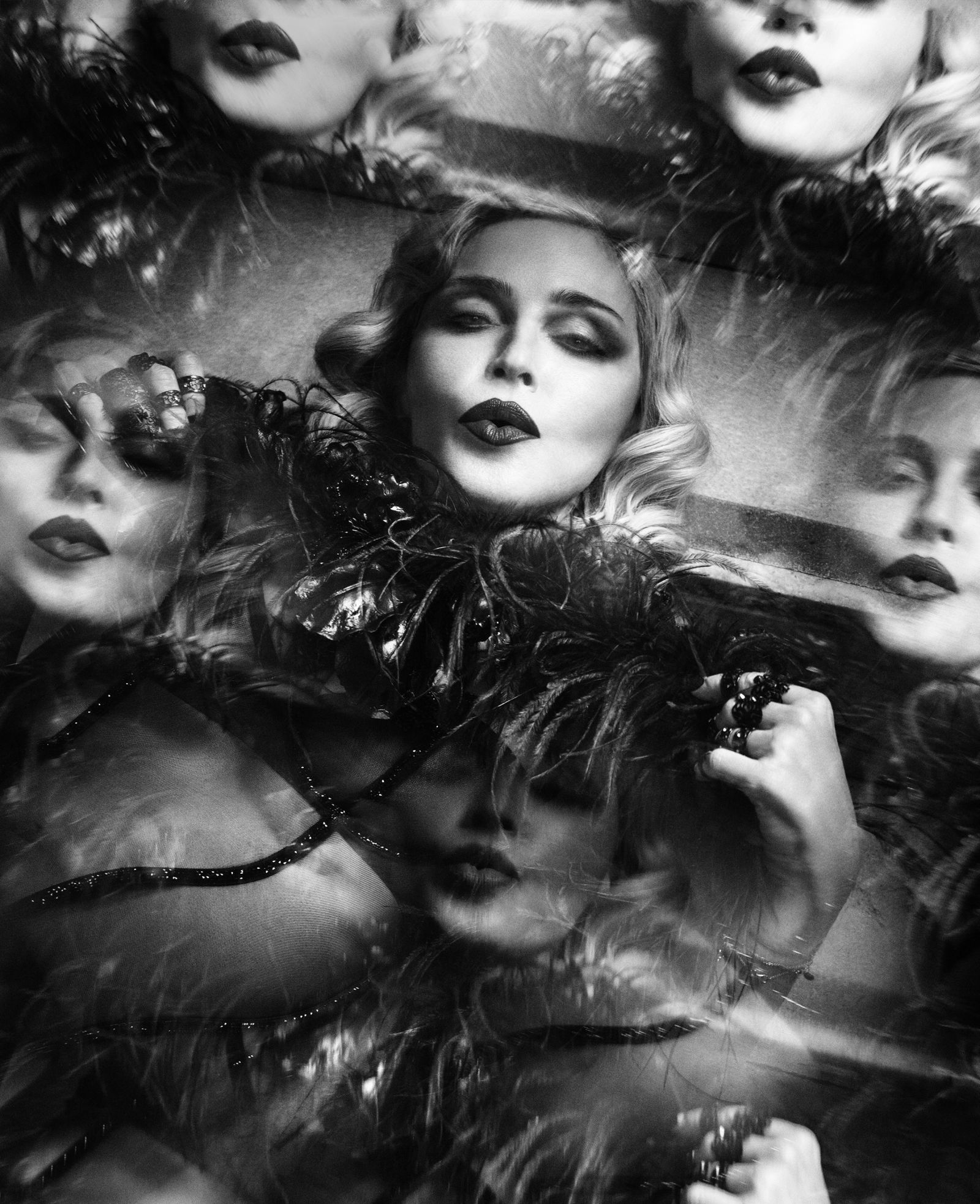
Michael Schmidt Studios boa; La Perla bodice; Mordekai by Ken Borochov rings.
RG: What are you reading right now?
M: I’m reading several books. I cheat on my books a lot, which is not a good thing because it’s good to stick with one book and get to the end of it, but I’m a book philanderer. I’m reading The Dovekeepers, by Alice Hoffman, and before that I was reading All the Light We Cannot See, by Anthony Doerr. I was also reading Isak Dinesen’s Out of Africa, even though it’s not a new book.
RG: My editor at Harper’s Bazaar told me that you read an excerpt from The Beautiful and Damned for a video that you did for the magazine. I was curious as to why you chose that book.
“I refuse to live a conventional life. I’ve created a very unconventional family. I have lovers who are three decades younger than me. This makes people very uncomfortable.”
M: I worship F. Scott Fitzgerald and I love his writing, and I felt like what we were shooting, that somehow there was some kind of connection to his stories and the decadence of that time, but also to the lack of expression. Or the inability of women to express themselves really. They were beautiful and damned.
RG: I have one last question: What do you like most about the art that you make?
M: I think it depends on what I’m making. I like pushing the envelope. But I don’t like to do it just for the sake of doing it. I don’t like to be provocative for the sake of being provocative. I like to be provocative. I like to make people think. I like to touch people’s hearts. And if I can do all three of those things in one fell swoop, then I feel like I’ve really accomplished something.
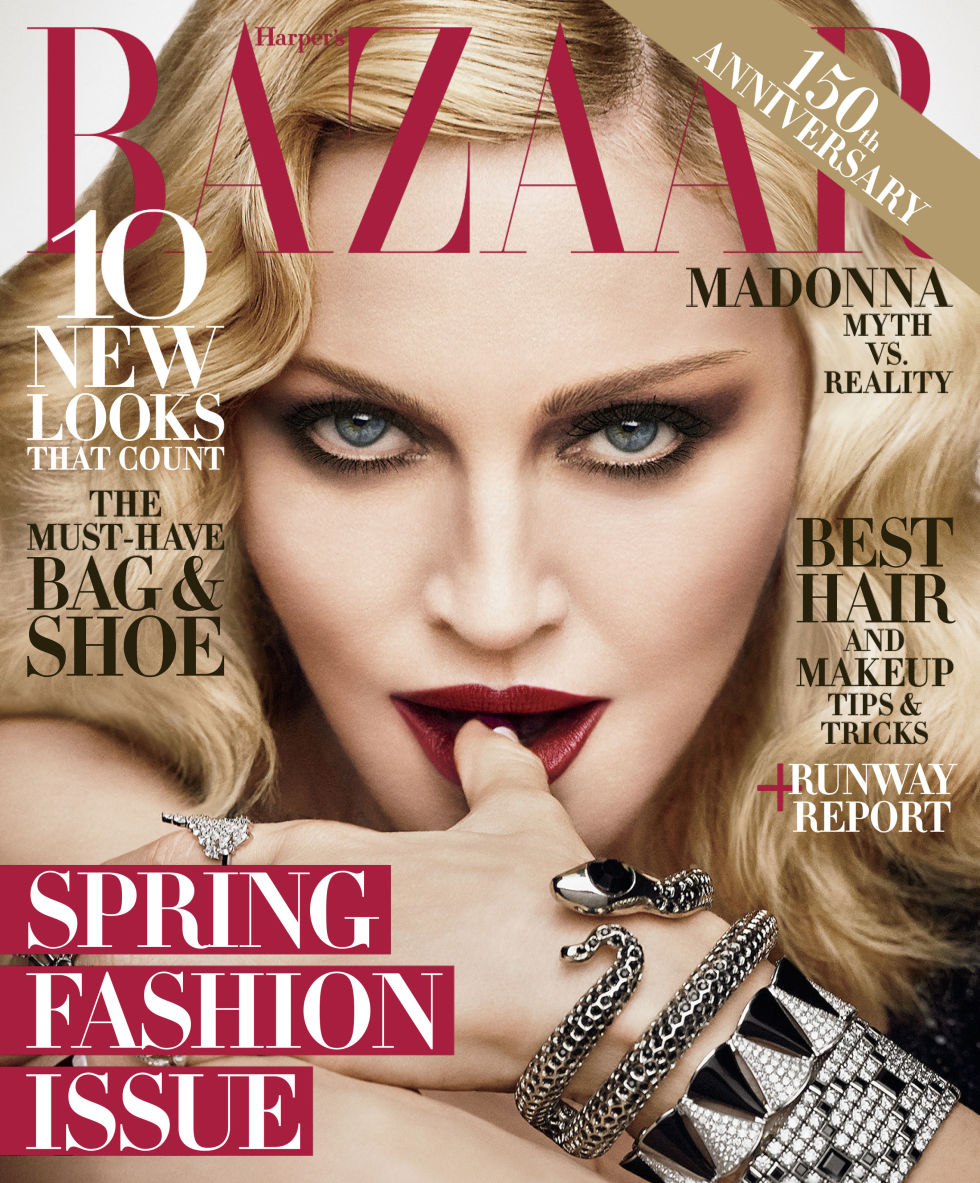
Gucci gown; Madonna’s own snake bracelet; Bulgari bracelet; Tiffany & Co. bracelet; Fallon ring.
See a behind-the-scenes look at Madonna’s cover shoot here:
Subscribe to Harper’s Bazaar: http://bit.ly/SUBSCRIBEtoBAZAAR
http://instagram.com/p/BPFY3OZDgyN/

